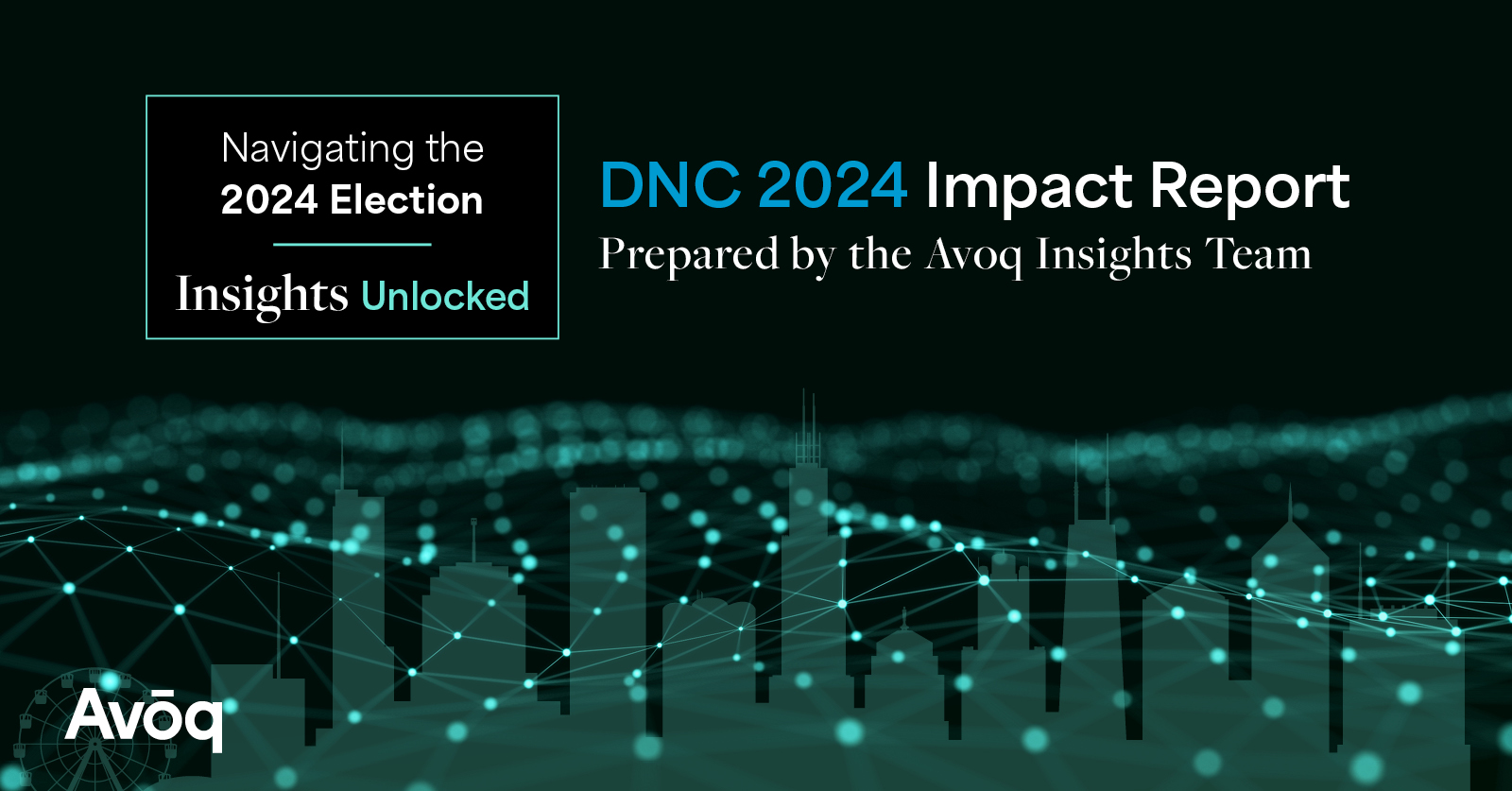By Alden Daniel and Kyle Taylor
Following weeks of Democratic anxiety about the ticket, President Biden’s shocking decision to not pursue re-election and his replacement with Vice President Harris late in the election cycle, the Democratic National Convention seemed poised for chaos and disarray.
It was not. To the contrary, the convention was notable for being ordinary—even as the circumstances around it have been extraordinary. Like the Republican National Convention last month, the DNC was a major national event, scoring an 8.6 out of 10 on Avoq’s Tremor Sense rating (the RNC scored a nearly equivalent 8.5).
Harris was reintroduced to the electorate as the new nominee, shifting media focus away from the end of the Biden campaign, while unveiling the Democratic ticket’s new tone. The result was a unified front, buoyed by a reinvigorated base, with a coherent and feisty message heading into the fall. Avoq Co-Founder and Managing Partner, Steve Elmendorf, described conventiongoers as exuberant and “as fired up as I have ever seen in 10 conventions.”
President Biden’s speech on the first night addressed the elephant in the room head-on, with Biden simply saying “I love the job, but I love my country more. I love my country more, and we need to preserve our democracy.”
And with that, attention turned to Kamala Harris and her campaign’s approach to beating Trump. In sharp contrast to the RNC, the DNC featured the typical array of political insiders and party leaders. The candidates, their families and up-and-coming voices in the party dominated headlines and social media conversation for the week. The biggest moment on social media was the overwhelmingly positive response to Gus Walz’s emotional reaction to seeing his father on stage, a 7.7 out of 10 on Avoq’s Tremor Sense scale.
The Harris campaign leaned into its role as the newcomer, wielding feisty and combative messages intended to draw sharp comparisons to both the RNC and Trump himself. Tuesday night typified this new strategy. Barack Obama crudely mocked Trump’s obsession with crowd sizes and Michelle Obama made fun of Trump’s use of the phrase “black jobs.” Meanwhile, Harris and Walz held a parallel rally at the Fiserv forum in Milwaukee, which hosted the RNC only a few weeks ago. The rally showed the enthusiasm of the Democratic base and invited comparisons to the RNC’s crowd size.
These comparisons found a receptive audience. The most read article about the DNC was about how it beat the RNC’s TV ratings, which was read nearly 11 million times – almost twice the readership of the most read article from the RNC. Social media users seized on the DNC’s “USA” signs that were in sharp contrast to the “Mass Deportations Now!” signs at the RNC.
Our colleague, Barry LaSala, a Partner on Avoq’s Government Relations team, described the convention as “recasting the concepts of freedom and patriotism, along with an economic agenda focused on the middle class.”
It generated runaway enthusiasm among the Democratic base, while pivoting attention to Harris as the new nominee, reintroducing her to the electorate, and showcasing a new kind of campaign.
At Avoq, we prioritize understanding the motivations of different audiences, helping us offer solutions that make an impact. Our 2024 RNC Impact Report dives into what media stories gained the most traction and what resonated online during last week’s convention. The findings help us understand how key moments from the Convention resonated inside the hall and online – and what contrasts in these reactions tell us about what’s important to stakeholder groups important to our clients. Download the full report here.
About Alden
Alden specializes in media and geopolitical analysis, working with the insights & strategic planning team to track online conversations, develop niche audiences and analyze current events. He works with a range of clients and specializes in the defense and technology sectors.
Before joining Avoq, Alden attended graduate school at the Johns Hopkins School of Advanced International Studies, concentrating in strategic studies and international economics. His research focused on Russian information operations and how social media impacts the democratic process. Previously, he worked for Philadelphia-based law firm Kohn, Swift & Graf as a paralegal, where he contributed original research on a wide range of cases, including terrorism, human rights and antitrust lawsuits.
Read Alden’s full bio.
Connect with Alden on LinkedIn.
About Kyle
Kyle conducts data-driven research for Avoq’s insights team on brand messaging, media coverage and audience groups to inform clients’ strategic communications plans and help them develop public affairs goals.
Before Avoq, Kyle was a regional director for the North Carolina Democratic Party, as well as a field organizer in Iowa during Sen. Elizabeth Warren’s presidential campaign. Before that, he worked at Pew Research Center, where he studied topics including technology trends, the news media, populism and international affairs.
Read Kyle’s full bio.
Connect with Kyle on LinkedIn.




